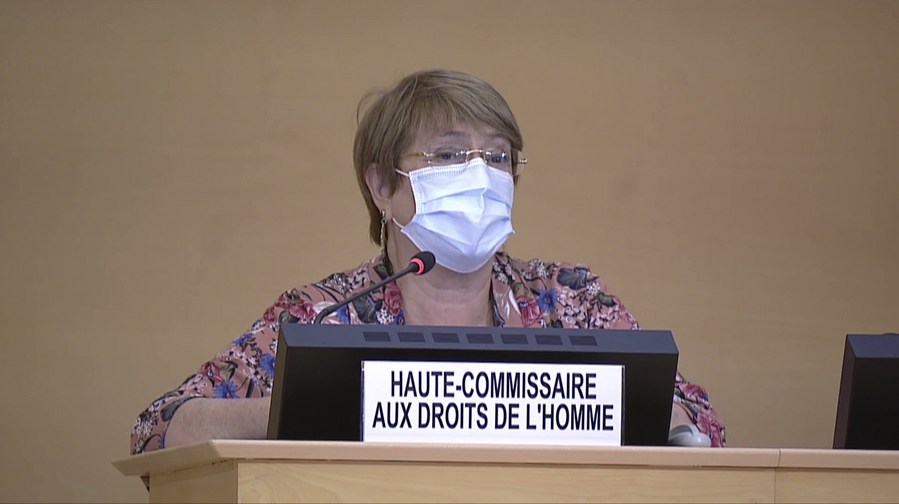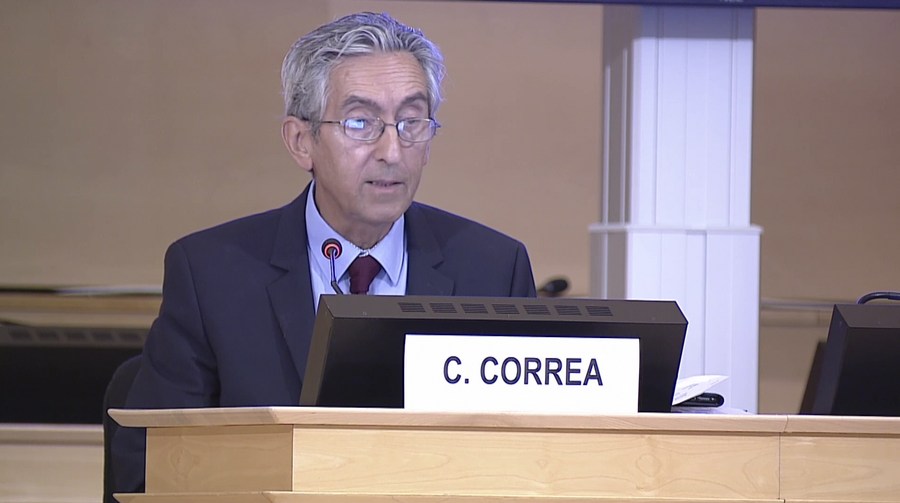

-- Participants of the biennial panel on the right to development were unanimous in their appeal for "heightened solidarity and renewed multilateralism" to help developing countries overcome the crisis caused by the COVID-19 pandemic.
-- Participants of the panel noted that developing countries are faced with obstacles to the right to development that predated the pandemic, most of which stemmed from the international order imposed by hegemonic powers.
-- Apart from its consistent support to the full realization of the human right to development and its vigorous defense of multilateralism and international cooperation, China has been assisting other countries in overcoming the COVID-19 pandemic and contributing to the fulfillment of the UN 2030 Sustainable Development Goals.
GENEVA, Sept. 24 (Xinhua) -- As protectionism and unilateral coercive measures pursued by some major global players sabotage the world's efforts to overcome the COVID-19 crisis, China has stepped up its support for the United Nations (UN), placing the right to development at the center of international cooperation.
During the ongoing 45th session of the United Nations Human Rights Council (UNHRC), which takes place between Sept. 14 and Oct. 6, participants called for strengthening international cooperation and solidarity in the fight against COVID-19 at a biennial panel on the right to development.
Nevertheless, as the development goals of the most vulnerable developing countries stagger under the economic burden caused by the new coronavirus, there is a lack of consensuses among countries on how to put an end to the disturbing trend.
PUSH FOR DEVELOPMENT
Although the world will mark the 35th anniversary of the Declaration on the Human Right to Development next year, work for its implementation remains insufficient, partly due to the protective and unilateral coercive measures adopted by some major countries.
To propel the realization of the right to development, China has submitted two resolutions that were adopted by the UNHRC.
The latest resolution entitled "The Contribution of Development to the Enjoyment of All Human Rights" encouraged all countries to promote a sustainable and people-centered development.
The other resolution, jointly proposed by China and the Non-Aligned Movement and adopted at the 42nd session of the UNHRC, emphasizes an "urgent need to make the right to development a reality for everyone."
As the COVID-19 crisis has made the fulfillment of the right to development fall behind its schedule, Chen Xu, China's permanent representative to the UN Office at Geneva, voiced concerns that many developing and least developed countries affected by COVID-19 and unilateral coercive measures are facing severe challenges in fulfilling international human rights obligations.
"We call upon the United Nations High Commissioner for Human Rights to provide technical assistance upon the request of the states concerned and oppose unilateral coercive measures," Chen said at the 45th session of the UNHRC, urging the international community to uphold multilateralism, strengthen unity and jointly address global challenges.
China has been working with members of the Group of 20 to implement the Debt Service Suspension Initiative for the poorest countries and called on international financial institutions and private creditors to take concrete actions in that regard, according to a position paper issued by China on the 75th anniversary of the UN.
ASSISTANCE NEEDED
Participants of the biennial panel on the right to development were unanimous in their appeal for "heightened solidarity and renewed multilateralism" to help developing countries overcome the crisis caused by the COVID-19 pandemic.

A screenshot taken on Sept. 24, 2020 shows Michelle Bachelet, the UN High Commissioner for Human Rights, speaks at the 45th session of the United Nations Human Rights Council (UNHRC) in Geneva, Switzerland, Sept. 17, 2020. (Xinhua/Du Yang)
According to UN High Commissioner for Human Rights Michelle Bachelet, the pandemic, coupled with the climate emergency, is the gravest global threat in generations, which has shaken "to its very core" the 2030 Sustainable Development Agenda.
Bachelet said the situation demands bold policies and financial and technical support for countries and communities in need, including through urgent debt relief.
At the moment, between 70 and 100 million people are being plunged into extreme poverty, warned Isabelle Durant, deputy secretary-general of the UN Conference on Trade and Development.
Developing countries will suffer from a funding gap of between 2 and 3 trillion U.S. dollars in the following two years, Durant said, adding the situation is further aggravated by the expected decline in official development assistance, foreign direct investments and remittances from migrant workers and diasporas.
Members of the Non-Aligned Movement also warned of the negative impact of the pandemic on developing countries, which created difficulties for the realization of the right to development.
"Equitable access, distribution, and affordability of diagnostics, therapeutics, and vaccines for COVID-19 are important priorities for developing countries and least developed countries," noted Vaqif Sadiqov, permanent representative of Azerbaijan to the UN Office at Geneva (UNOG).
The world needs new economic models that are sustainable, people-centered and inclusive, said Maria Mercedes Rossi, main representative of the Associazione Comunita Papa Giovanni XXIII to the UNOG.
"Urgent action was needed now, including debt cancelation, ending unilateral coercive measures, countering tax havens and corruptions," she said.
APPEAL FOR MULTILATERALISM
Participants of the panel noted that developing countries are faced with obstacles to the right to development that predated the pandemic, most of which stemmed from the international order imposed by hegemonic powers.
Unilateralism and protectionism of certain countries that have been eroding mutual trust and coordination among countries for long exploded amid the pandemic.

A screenshot taken on Sept. 24, 2020 shows Carlos Correa, executive director of the South Centre, an intergovernmental organization of developing countries, speaks at the 45th session of the United Nations Human Rights Council (UNHRC) in Geneva, Switzerland, Sept. 17, 2020. (Xinhua/Du Yang)
The crisis significantly hampered the realization of the right to development, said Carlos Correa, executive director of the South Centre, an intergovernmental organization of developing countries.
Correa cautioned against dangerous actions aimed at weakening the World Health Organization, a return to isolationist policies such as "vaccine nationalism," as well as unilateral coercive actions.
"Persistence of unilateral coercive actions is manifestly contrary to international law and ethically unacceptable, particularly at a time of greater desolation and suffering of the populations of the affected countries," he said.
Developed countries should honor their development assistance commitments, not attach political requirements, and safeguard multilateralism and the multilateral trading system, a Chinese representative said at the biennial panel on human rights on Sept. 17.
Amid a once-in-a-century transformation brought on by the pandemic, "certain countries and political forces keep playing the blame game, clamoring for 'decoupling' and pulling out of international organizations and agreements," reads China's position paper on the 75th anniversary of the UN.
"What they are doing is sabotaging international cooperation, stoking confrontation between ideologies and social systems and putting the world in serious jeopardy," it reads.
PRECONDITION FOR ALL HUMAN RIGHTS
Apart from its consistent support to the full realization of the human right to development and its vigorous defense of multilateralism and international cooperation, China has been assisting other countries in overcoming the COVID-19 pandemic and contributing to the fulfillment of the UN 2030 Sustainable Development Goals.
While advancing the implementation of the 2030 Agenda at home, China is working with other countries to put development front and center in the global macro policy framework and seek greater synergy between the Belt and Road Initiative and the 2030 Agenda, according to its position paper.
The paper highlights the right to a happy life as the most important of all, and reiterates China's commitment to promoting and protecting human rights through greater development.
At the UNHRC panel, China called on all countries to follow the UN Declaration on the Right to Development as a guide, insist on putting people at the center, uphold the vision of innovative, coordinated, green, open and inclusive development, and strive to implement the 2030 Agenda to promote the realization of the right to development.
People around the world have been witnessing for a long time how harmful protectionism and unilateral coercion measures are for the future of developing and least developed countries, while the pandemic has accentuated the importance of another vital human right -- the right to health.
However, the vital factor behind the realization of all human rights is development. Just as Chen has said, without it, "there are no human rights to talk about."
All countries should adhere to multilateralism and international cooperation, take clearly-targeted and coordinated actions to effectively combat the pandemic, promote sustainable and inclusive economic recovery and growth, and accelerate the implementation of the 2030 Agenda, a Chinese representative said during this year's UNHRC session.

 Award-winning photos show poverty reduction achievements in NE China's Jilin province
Award-winning photos show poverty reduction achievements in NE China's Jilin province People dance to greet advent of New Year in Ameiqituo Town, Guizhou
People dance to greet advent of New Year in Ameiqituo Town, Guizhou Fire brigade in Shanghai holds group wedding
Fire brigade in Shanghai holds group wedding Tourists enjoy ice sculptures in Datan Town, north China
Tourists enjoy ice sculptures in Datan Town, north China Sunset scenery of Dayan Pagoda in Xi'an
Sunset scenery of Dayan Pagoda in Xi'an Tourists have fun at scenic spot in Nanlong Town, NW China
Tourists have fun at scenic spot in Nanlong Town, NW China Harbin attracts tourists by making best use of ice in winter
Harbin attracts tourists by making best use of ice in winter In pics: FIS Alpine Ski Women's World Cup Slalom
In pics: FIS Alpine Ski Women's World Cup Slalom Black-necked cranes rest at reservoir in Lhunzhub County, Lhasa
Black-necked cranes rest at reservoir in Lhunzhub County, Lhasa China's FAST telescope will be available to foreign scientists in April
China's FAST telescope will be available to foreign scientists in April